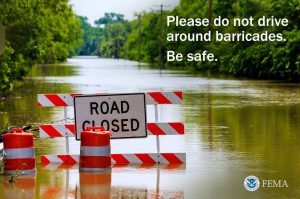PRESS RELEASE
FOR IMMEDIATE RELEASE
Contact: Amber Burch, 647-8187
Volunteering After a Flood Event
With the recent flooding in the area, many people are looking to help their fellow neighbors clean-up what the waters left behind. While rain can wash away dirt and small debris during normal rain events, flooding as has recently been experienced can carry with it embankments, trees, roads, and numerous other items. It is also important to recognize that it is not just the large debris that can cause problems in flood clean-up as flood waters often cause damage to gas tanks, sewage systems, and other systems containing chemicals and bacteria. To ensure a community can remain healthy and active after a flood event, clean-up is vital.
Though it can take a lot of time and effort, a well-organized and prepared group of volunteers can be the solution to that. It is important for anyone cleaning after a flood to take precautions to protect themselves and their families from the potential hazards existing in flood waters. All volunteers should wear rubber boots and pants for walking in mud and small amounts of water. Please take caution while walking on muddy surfaces, as mud can be extremely slippery. Depending upon the type of work being done, volunteers should also be wearing either heavy-duty work gloves or latex-free gloves.
One of the most important steps to volunteering in clean-up efforts is checking in with the community you are helping out in. By checking in, you can be sent to the clean-up effort that best fits you. Some are not able to carry items out of basements while others may not be able to tolerate cleaning with bleach or vinegar. To best ensure that the right help is getting to the right places, communities seeking volunteer help will provide information to local residents on where to check in if they are needing volunteers to help them or if they themselves are willing to volunteer. Common roles people might play in flood clean-up are carrying damaged items from basements, mucking out mud and other flood debris, wiping down and cleaning walls and floors. Also, individuals who are able to volunteer with equipment such as skid steers can also play a vital role such as in helping move garbage from the curbside to dumpsters, thereby keeping the streets clean and accessible. Checking in at a volunteer registration location will also help these communities as all of the time logged by volunteers is reported to FEMA to help show the extent of damages and the needs of the municipality.
Checking in also reduces the liability to the municipality or community requesting the volunteers. It would be an unfortunate situation if a volunteer were to get hurt and had not checked in prior to assisting. In addition, spontaneous volunteers who simply show up to a location without checking in at a registration center can overwhelm communities that are not prepared for them and may have too many people at one location and not enough at another.
Volunteers are a vital role in flood recovery, and efforts to help the community are always appreciated. However, when these efforts are not organized or volunteers are not appropriately prepared for the working conditions, simple clean-up can become its own disaster.
 Flooding is the leading cause of severe weather-related deaths in the U.S. claiming on average nearly 100 lives a year. Most of these deaths occur in motor vehicles when people attempt to drive through flooded roadways. Many other lives are lost when people walk into or near flood waters. This happens because people underestimate the force and power of water, especially when it’s moving. The good news is it is preventable with the right knowledge and tools.
Flooding is the leading cause of severe weather-related deaths in the U.S. claiming on average nearly 100 lives a year. Most of these deaths occur in motor vehicles when people attempt to drive through flooded roadways. Many other lives are lost when people walk into or near flood waters. This happens because people underestimate the force and power of water, especially when it’s moving. The good news is it is preventable with the right knowledge and tools.